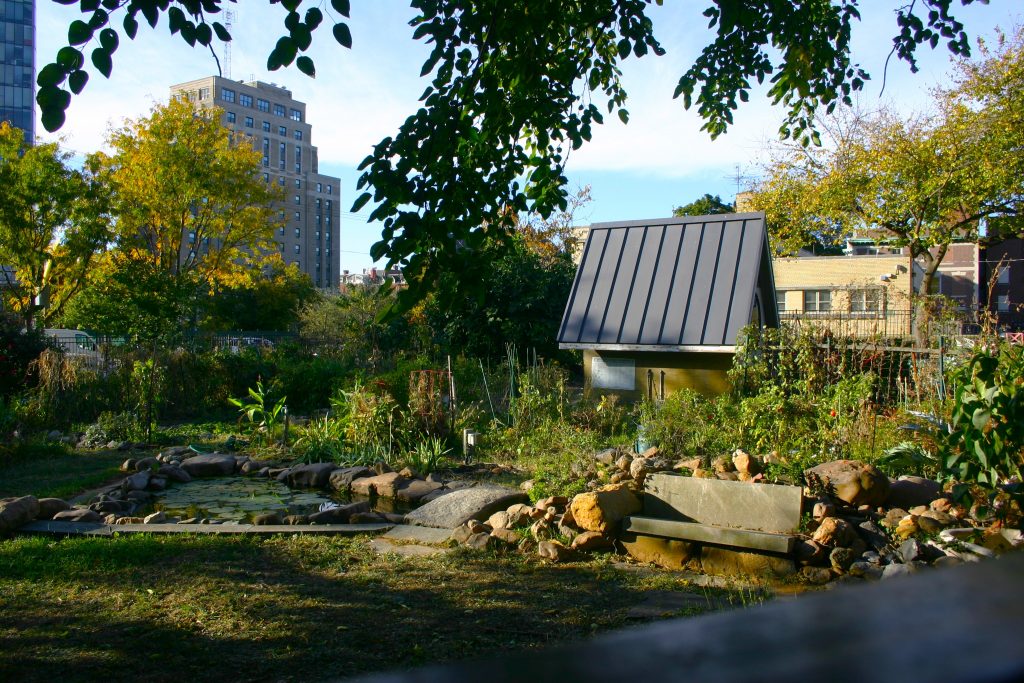
Ownership of the Summer-Winter Community Garden, located at 33rd and Race Streets, will soon be formally transferred from the city of Philadelphia to the nonprofit Neighborhood Gardens Trust for permanent preservation. At its monthly meeting on Oct. 9, the Philadelphia Redevelopment Authority voted to grant the three properties the garden has occupied since 1977 to NGT. The garden has served as a landmark and refuge for generations of Drexel University students, and several Drexel student organizations manage plots in the garden alongside local residents.
While the land disposition has not yet been finalized, it is expected to be conducted by a 30-year mortgage, toward which no payments will be due. Two other community gardens, the Wiota Street and Hawthorne Community Gardens, were also set to be conveyed to NGT at the October meeting.
The Neighborhood Gardens Trust is a local, nonprofit land trust supported by the Pennsylvania Horticultural Society that works to preserve community gardens across the city and provide resources for gardeners. The PHS is best known for arranging the annual Philadelphia Flower Show; on campus, it manages the Gateway Garden along Lancaster Walk and oversees the Maker’s Market and Meet the Brewers popups.
While city ownership might suggest that the garden was protected from development, preservation of the garden was at odds with the mission of the PRA, a city agency established in 1945 to combat blight and urban decline. With a total assessed value of $2.9 million, volunteers and nonprofits have long been concerned for the garden’s future and began to seek a permanent preservation agreement.
According to Jenny Greenberg, Executive Director of NGT, the land trust has held a year-to-year lease on the site since 2006. However, with no deed restriction or covenant to preserve it as open space, it remained open to redevelopment. The long-term mortgage arrangement with the city will close this loophole.
However, such mortgage arrangements have been criticized by nonprofits. In 2023, the Public Interest Law Center published a letter to the city on behalf of community gardening groups warning that this policy is not best practice and discourages preservation. Cited foremost is the financial risk. While the city issues the mortgage at market value, the value of the land is greatly reduced by the accompanying deed restrictions. This gulf between outstanding mortgage balance and lowered land value is a liability that nonprofits must list on their yearly balance sheets, painting a misleading picture of their health.
“In the past, NGT acquired land from the Philadelphia Redevelopment Agency which was deed restricted for open space and has a restrictive covenant so that the land would go back into city ownership if it ceased to be cared for as a garden. Those restrictions seemed sufficient, but we’ve been told that PRA is using the mortgage as a ‘belt and suspenders’,” Greenberg stated.
This disparity in value is an even greater risk in the event of default, as the city may collect the full balance of the mortgage in foreclosure — leaving the nonprofit to come up with the difference, or deficiency. Furthermore, vague requirements, such as that gardens must be kept “clean and free of debris,” are potential grounds for foreclosure.
While the mortgage arrangement carries its own risks, it cements the Summer-Winter Garden’s place in Powelton Village for the present. What stands as an urban oasis today is also a tangible reminder of the urban renewal initiatives Philadelphia leaders embraced postwar.
While Drexel occupies much of the surrounding land, the garden has remained a holdout under PRA ownership since 1967. The PRA has been a presence in West Philly since the 1950’s when it began using city and federal dollars to acquire swathes of housing in low-income neighborhoods and repackage them into large units. These units were turned over to private developers for a nominal price, often $1. Drexel and the University of Pennsylvania acquired much of their present footprints from the PRA.
The most infamous of these redevelopment projects took place in Unit 3, which encompassed the neighborhood of the Black Bottom, a working-class Black community extending south of Lancaster Avenue to Penn’s campus. A Penn-Drexel consortium began purchasing land while the PRA acquired holdouts through eminent domain. Unit 3’s holdings were transferred to Penn and subsequently demolished almost entirely to become the University City Science Center. Thousands of residents were displaced.
Unit 5, which encompassed southern Powelton Village, was largely granted to Drexel to build new dormitories beginning in the 1960s. The PRA acquired the properties now occupied by the Summer-Winter Garden by 1967. Dozens of homes were demolished as part of the project. While the decades since have seen their share of conflict between residents and encroaching students, the garden stands now as a shared sanctuary.


